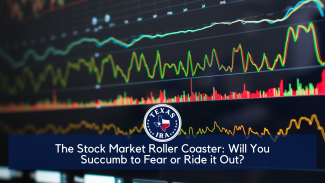
The Stock Market Roller Coaster
The Stock Market Roller Coaster: Will You Succumb to Fear or Ride it Out?
The stock market is like a roller coaster that goes unpredictably up and down. It can be fun and exciting one minute and terrifying the next. When people think of the stock market, they think of wealth accumulation. However, the stock market isn’t a QuickTrip lottery ticket to financial freedom. It simply doesn’t work that way.
Sometimes, the market does sway the way you want, but not always. Average investors find it difficult to accept that the market will experience periods of downturn, but it is completely normal. When the market becomes bearish, people react and tend to panic sell. If you are someone who panic sold in the last recession, a question to ask yourself is, was it beneficial to do that?
Don’t Jump Off in the Middle of the Ride
People invest in the stock market with the hopes of growing their income over the span of years. Investors earn income through selling stock when the price is higher than when they bought it, dividend payments, and compound interest. Compound interest can be a difficult concept to wrap your head around because the primary variable in the formula is time. Time (being decades) is where the benefit comes from when you are interested in investing in the stock market.
It isn’t just about buying and selling and trying to outsmart the market like you see in the movies. There are successful day professional traders in real life, but that is extremely risky and not recommended for the average investor. You and me, the long-term or passive investor uses compounding and diversification as the main strategies for wealth accumulation and preservation.
Legendary investor Charlie Munger once said, “The first rule of compounding is never to interrupt it unnecessarily.” Behavioral finance author Morgan Housel built upon that concept when he talked about how if financial professionals could convince their clients to never interrupt the compounding of their investments (by succumbing to fear and panic selling during market volatility), they will have earned their fee for a good while. That is a bit of hyperbole, but conceptually, the statement rings true.
Find Your Safety Harness
When it comes to the stock market, there is no one way to invest. Everybody is unique, with a different risk tolerance, income level, and past experiences. The past is a part of what kind of investor we become as adults. If you were somebody who grew up during the Great Depression, you may be more risk-averse and focused on stability. Another often overlooked factor is how we learn how to invest, build a portfolio, and rebalance it over time. Vanguard has found that working with a financial professional can increase investment returns by 3%. In investing, when compounding over the years, three percent is huge.
The reasoning behind this is that it isn’t just about which investments to consider and how to compile your portfolio but also those other less glamorous factors, including lowering your tax burden, creating a manageable budget, maximizing your social security benefits when eligible, and staying true to your strategy.
Learn How to Handle the Climbs and Drops
You may have heard through the news the rumors of a possible recession. Reports like that tend to make investors nervous. But should it? As a market is crashing, it seems counterintuitive to sit and ride it out while everyone around you is jumping ship and selling their interests.
However, there was a study done by Bank of America using data going back to 1930 that shows investors who panicked and missed the S&P’s ten best days in each decade had total returns of about 91% instead of the 14,962% return they would have experienced had they just rode it out and waited until the market volatility leveled out.
Always Ride With a Partner
Before you strap in for another unpredictable go-around, remember these three key takeaways:
- Be patient and don’t panic
- Diversify your portfolio
- Consult a financial professional
Take the time to meet with a financial professional to review your investments and strategy. Calculate your risk tolerance and create a long-term financial plan for when you retire hopefully lessening the possibility of financial difficulty so you can spend more time enjoying your hobbies and family.
You can’t predict how the market is going to fluctuate and what events in life will impact its movement. It truly is a roller coaster with the potential to give people a fair return and a good scare; however, historically, the market has always bounced back. Will you succumb to the fear of a volatile market or ride it out?
Important Disclosures:
The opinions voiced in this material are for general information only and are not intended to provide specific advice or recommendations for any individual.
Investing in stock includes numerous specific risks including: the fluctuation of dividend, loss of principal and potential illiquidity of the investment in a falling market.
No investment strategy or risk management technique can guarantee return or eliminate risk in all market environments.
There is no guarantee that a diversified portfolio will enhance overall returns or outperform a non-diversified portfolio. Diversification does not protect against market risk.
Rebalancing a portfolio may cause investors to incur tax liabilities and/or transaction costs and does not assure a profit or protect against a loss.
Past performance is no guarantee of future results.
This information is not intended to be a substitute for specific individualized tax advice. We suggest that you discuss your specific tax issues with a qualified tax advisor.
All information is believed to be from reliable sources; however, LPL Financial makes no representation as to its completeness or accuracy.
S&P 500 Index: The Standard & Poor's (S&P) 500 Index tracks the performance of 500 widely held, large-capitalization US stocks.
This article was prepared by LPL Marketing Solutions
Sources:
Why long-term investors should never sell stocks in a panic (cnbc.com)
Housel, Morgan. The Psychology of Money. Harriman House, September 13, 2022.
Compoundingquotes — Investment Masters Class (mastersinvest.com)
LPL Tracking # 500622

